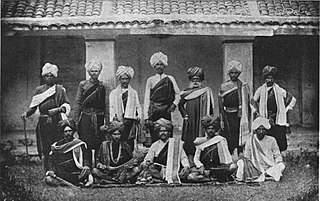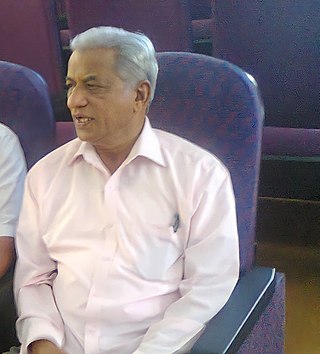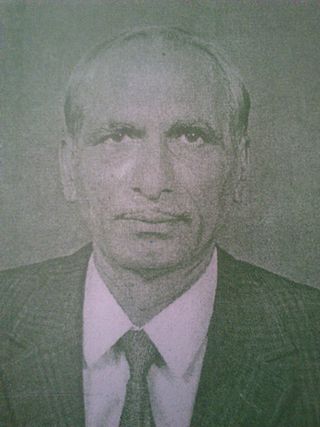Arebhashe or Aregannada or Gowda Kannada is a dialect of Kannada mainly by Gowda and other communities in the region Madikeri, Somwarpet, and Virajpet taluks of Kodagu district, Sullia, taluks of Dakshina Kannada district; Bangalore and Mysore districts in the Indian state of Karnataka. As well as Bandadka, Kasaragod District in the Indian state of Kerala, Arebhashe is also called Gowda Kannada. The language was recognized by the Karnataka State government and formed an academy in 2011 to preserve the culture and literature of the Arebhahse Region which is named as Karnataka Arebhashe Samskruthi mathu Sahitya Academy supported by then Chief Minister D. V. Sadananda Gowda.

The Smartatradition, also called Smartism, is a movement in Hinduism that developed and expanded with the Puranas genre of literature. It reflects a synthesis of four philosophical strands, namely Mimamsa, Advaita, Yoga, and theism. The Smarta tradition rejects theistic sectarianism, and is notable for the domestic worship of five shrines with five deities, all treated as equal – Ganesha, Shiva, Shakti, Vishnu and Surya. The Smarta tradition contrasted with the older Shrauta tradition, which was based on elaborate rituals and rites. There has been a considerable overlap in the ideas and practices of the Smarta tradition with other significant historic movements within Hinduism, namely Shaivism, Brahmanism, Vaishnavism, and Shaktism.

Palya Lankesh was an Indian poet, fiction writer, playwright, translator, screenplay writer and journalist who wrote in the Kannada language. He was also an award-winning film director.

Vokkaliga is a community, or a group of closely related castes, from the Indian state of Karnataka. They are also present in the neighbouring state of Tamil Nadu.
S. N. Balagangadhara is a professor emeritus of the Ghent University in Belgium, and was director of the India Platform and the Research Centre Vergelijkende Cutuurwetenschap.

Theerthapura Nanjundaiah Srikantaiah commonly known as 'Thee. Nam. Shree., was a Kannada poet, essayist, editor, translator, linguist and teacher. He was awarded the Pampa Prashasthi for his work on the history and tradition of Indian poetics spanning two millennia titled Bharathiya Kavyamimamse. T. N. Srikantaiah was instrumental in preparing and publishing the Kannada version of Constitution of India in 1952. He is credited with the use of the vernacular equivalent of Rashtrapathi for the English 'President', a usage which is still in vogue. Srikantaiah was responsible for guiding the doctoral theses of Kannada litterateurs like S. Anantanarayan and M. Chidananda Murthy. An active participant in the Kannada Dictionary Project, Srikantaiah later laid the foundations for the Post Graduate Department at Manasa Gangotri campus at University of Mysore.

Ninasam is a cultural organisation located in the village of Heggodu in Sagar Taluk of the Shivamogga district in the state of Karnataka, India. Ninasam is the short form of Sri NIlakanteshwara NAtyaseva SANgha, an organisation dedicated to the growth of drama, films and publishing. Akshara, the current head of Ninasam, tells a story where Ni means you, Na means me, and Sam is a pun on the English word Sum, and in music is the moment where rhythm comes together. Ninasam was the brainchild of the renowned dramatist and Magsaysay award winner, K V Subbanna. As he said, it is the communitarian activity. Ninasam works similarly to a co-operative society. Currently A R Shreedhara Bhatt, a retired revenue officer, is the president, and K V Akshara, the son of Subbanna, is the director.

Chandrashekhara Kambara is a prominent Indian poet, playwright, folklorist, film director in Kannada language and the founder-vice-chancellor of Kannada University in Hampi also president of the Sahitya Akademi, country's premier literary institution, after Vinayak Krishna Gokak (1983) and U.R. Ananthamurthy (1993). He is known for effective adaptation of the North Karnataka dialect of the Kannada language in his plays, and poems, in a similar style as in the works of D.R. Bendre.
This article contains the index of articles related to Jainism.
Hindu studies is the study of the traditions and practices of the Indian subcontinent, and considered as a subfield of Indology. Beginning with British philology in the colonial period, Hindu studies has been practiced largely by Westerners, due in part to the lack of a distinct department for religion in Indian academia. Since the 1990s this has caused some dissent from Hindus, raising questions in academia about the role of Hindu studies in creating postcolonial images of India.
Suryanath Upendra Kamath was an Indian historian who served as the Chief Editor of the Karnataka State Gazetteer from 1981 to 1995.

Kallahalli Sannegowda Bhagawan, known as Prof. K. S. Bhagawan, is an Indian Kannada writer, rationalist, translator, critic, scholar and retired professor. In addition to his works on Hinduism, Indian culture and history, he has translated the works of William Shakespeare including Julius Caesar and Hamlet. He is a recipient of many awards including the Rajyotsava Award, Kuvempu Award and the Lokayata Award.

Dr. D. R. Nagaraj was an Indian cultural critic, political commentator and an expert on medieval and modern Kannada poetry and Dalit movement who wrote in Kannada and English languages. He won Sahitya Akademi Award for his work Sahitya Kathana. He started out as a Marxist critic but renounced the Marxist framework that he had used in the book Amruta mattu Garuda as too reductionist and became a much more eclectic and complex thinker. He is among the few Indian thinkers to shed new light on Dalit and Bahujan politics. He regarded the Gandhi-Ambedkar debate on the issue of caste system and untouchability as the most important contemporary debate whose outcome would determine the fate of India in the 21st century.

A. K. Shastry was an Indian historian in the state of Karnataka, India.

Sondekoppa Srikanta Sastri was an Indian historian, Indologist, and polyglot. He authored around 12 books, over two hundred articles, several monographs and book reviews over four decades in English, Kannada, Telugu and Sanskrit. These include "Sources of Karnataka History", "Geopolitics of India & Greater India", "Bharatiya Samskruthi" and "Hoysala Vastushilpa". S. Srikanta Sastri was a polyglot well versed in fourteen languages spanning Greek, Latin, Pali, Prakrit, Sanskrit and German among others. He was Head of the Department of History & Indology at Maharaja College, University of Mysore between 1940 and 1960. He was conferred the Kannada Literary Academy award in 1970 and was subsequently honoured by Governor of Karnataka Mohanlal Sukhadia in 1973 during mythic society diamond jubilee function. A Festschrift was brought forth and presented to him during his felicitation function in 1973 titled "Srikanthika" with articles on History and Indology by distinguished scholars. His work on Indus Valley civilization and town planning at Harappa and Mohenjodaro were published in successive articles and drew considerable attention. His articles on The Aryan Invasion theory, the date of Adi Sankaracharya, Oswald Spengler's view on Indian culture, Jaina epistemology, Proto-Vedic religion of Indus Valley Civilization and evolution of the Gandabherunda insignia remain relevant today.

The definition of religion is a controversial and complicated subject in religious studies with scholars failing to agree on any one definition. Oxford Dictionaries defines religion as the belief in and/or worship of a superhuman controlling power, especially a personal God or gods. Others, such as Wilfred Cantwell Smith, have tried to correct a perceived Western bias in the definition and study of religion. Thinkers such as Daniel Dubuisson have doubted that the term religion has any meaning outside of western cultures, while others, such as Ernst Feil even doubt that it has any specific, universal meaning even there.
Sara Aboobacker was an Indian Kannada writer of novels and short stories, and a translator.
Kanaka Ha Ma is a noted Kannada poet and columnist. She has also been active as a theatre actor and a freelance journalist for Kannada publications.
Dr Lankappa Hanumanthaiah is an Indian Dalit poet, Indian politician, of Indian National Congress and a Member of the upper house of the Indian Parliament, the Rajya Sabha, from the state of Karnataka.
Abdul Rasheed is an Indian writer, poet, editor and translator from Karnataka. In 2004 he won Sahitya Akademi Golden Jubilee Award for lifetime achievement. He also a translator, blogger, columnist and radio personality.












